#James Howard Kunstler
Text
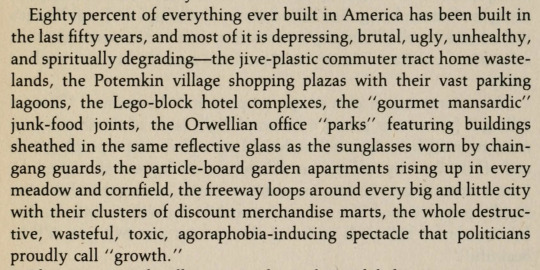
— James Howard Kunstler, The Geography of Nowhere
239 notes
·
View notes
Text
The book this blog is named after

The City In Mind: Notes on the Urban Condition is a set of travelogues and essays from urbanism commentator, gadfly and magic-realism author James Howard Kunstler.
You probably know him from his TED Talk, and from his first book, The Geography of Nowhere, both polemics about sprawl suburbia.
Of late, Kunstler’s become a bit of a reactionary doomer so his politics aren’t hopeful.
But this book was enlightening in its examination of the evolution of different cities: Paris, Atlanta, Mexico City, Berlin, Las Vegas, Rome, Boston, and London; infused with his preference for traditional architecture (take it or leave it), he reserves his satirical criticism mostly for the grotesqueries of Vegas and Atlanta.
I always thought this would make a great Netflix series, and I hope one gets made someday, but perhaps it does show its age and its author’s biases now.
4 notes
·
View notes
Text
This old saying remains powerful: “There are decades when nothing happens, and weeks when decades happen.”
3 notes
·
View notes
Text
OTHERS SAY IT BEST!
“Curiosity is the purest form of insubordination.—Vladimir Nabokov
Here is a collection of quotes from well-known people who describe what is happening accurately and succinctly. I could elaborate, but it seems redundant. I hope you will read each of these quotes and then pause a moment to reflect on their truth. Try to clear your mind of the fear and colorful propaganda that is beamed at you…

View On WordPress
#Covid#Dan Smoot#Dr David McCullough#fear#George Orwell#Health#James Howard Kunstler#James Madison#Joe Biden#Marcus Aurelius#Marie Curie#Upton Sinclair#Vladimir Nabokov
0 notes
Text
Waterplace and WaterFire, pt. 2
This tiny park sits at the new confluence of the Woonasquatucket and Moshassuck rivers forms the Providence River. The old confluence was under the old post office. (Photo by author)
This post reprints the second half of Chapter 21, “Waterplace and WaterFire,” from Lost Providence. The Waterplace design by Bill Warner was so good that many experts were confused. It reminded me of the what several…

View On WordPress
1 note
·
View note
Text
The Hunt
The HuntJames Howard Kunstler | Tor Books | 1988 | 224 pages
“If the creature is just a legend, then what’s trying to kill you?”
A trip into the isolated wilderness of Northern California becomes a struggle for survival for two men in search of Bigfoot, although the dangers may stem more from humans than from sasquatches.
Old college friends Billy Nichols and R.J. Traveal set out from San…
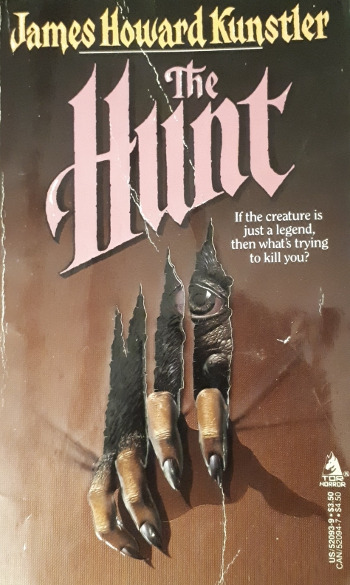
View On WordPress
#Backwoods#Bigfoot#Book Reviews#EIghties#Horror#James Howard Kunstler#Legendary Monsters#Northern California#Sasquatch#The Hunt#TOR Books#Vintage Paperbacks
1 note
·
View note
Text
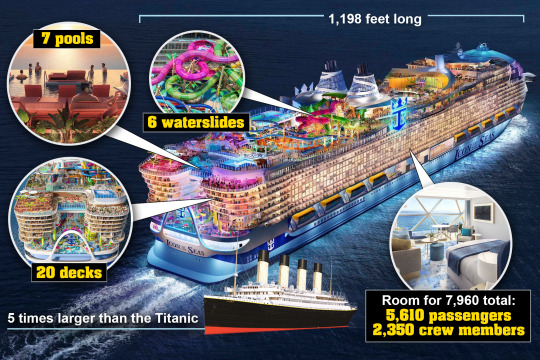
via James Howard Kunstler's "Eyesore of the Month" : This beast sets sail in January of 2024. Ask yourself: what sort of economy supports a venture like this? And what if it isn’t there anymore when this thing is ready to launch?
Behold, Royal Caribbean International’s new ship, Icon of the Seas. Well, okay, but icon of what, exactly, of the seas? Of the wretched excess that the cruise industry is sending forth to sail the oceans blue? I remind you: societies build their most extravagant monuments just before they collapse. This looks like the perfect vehicle for partying at the end-of-the-world (that is, the world as we know it). This monstrosity is so huge — equivalent of a 20-story building — that the promoters say it has “neighborhoods.” Below is the Royal Bay Pool in the new “Chill Island neighborhood.” Very posh, indeed. Excludes all the waddling, land-whales of the lower decks with their slushies and burritos in-hand.
17 notes
·
View notes
Text
Ok, so Firefox’s pocket suggestions have been trying to get me to read a list of “8 life-changing nonfiction books selected by top authors” and while I don’t really feel like reading that article, I think it could make a cool prompt. Nonfiction tends to have a rep for being dry or trite, but I think it can be powerful and engaging as well. I probably don’t have near enough followers to be doing a book rec post, but whatev, I like talking about books, we’re doing this.
Prompt: List 5-8 Life-Changing Nonfiction Books
In no particular order:
1. The Wisdom of Whores: Bureaucrats, Brothels, and the Business of AIDS by Elizabeth Pisani (2008)
This is probably the book I’m most scared to go back and read, because I suspect parts of it did not age well. I think she’s released an updated edition and I’m interested in revisiting that one. That said, as someone raised in a very conservative environment, this book completely revolutionized my thinking on harm reduction strategies like needle exchanges and free condoms from the cOnDONinG bAd beHaViOr bullshit I believed when I was younger to “oh look, a way to keep people alive and healthy”. She also had some eye opening comments on the “rescuing women from developing nation brothels” charities that were so popular in the 90s. I still think about the insights in this book often.
2. The Geography of Nowhere: The Rise and Decline of America’s Man-Made Landscape by James Howard Kunstler (1993)
I don’t know if I can even describe how foundational this book was for me when I first read it in my early 20s. Kunstler describes the way cars have usurped human comfort in American architecture, land management, and city planning in meticulous detail. It made me look at my environment with new eyes, and appreciate alternatives I had barely even grasped, in spite of having traveled internationally. I don’t recall Kunstler’s book explicitly speaking to the disabled community’s concerns with anti-car rhetoric, which have gotten increasingly relevant over time. But I still highly recommend the book as an excellent introduction for USians interested in improving our lived environment and anyone else who wants to know What The Hell Happened With The US And Cars.
3. Ratio: The Simple Codes Behind the Craft of Everyday Cooking by Michael Ruhlman (2009)
I’ve never been an intuitive cook: the kind of person who can look in the cupboard and throw together a dish based on what I can see. I actually started out baking almost exclusively, because the precision of baking recipes helped keep me from going astray. Ruhlman’s book was the first to help me crack the cooking code. Ironically, I’ve made very few of his recipes, which tend to have an overly fussy, professional chef ring to them. But learning about the basic ratios and techniques that went into popular western dishes helped me start to understand how cooking worked. It’s been 10 years since I read Ruhlman’s book, and I still often cook with a recipe. But sometimes I don’t. And his book is part of the reason why.
4. My Lesbian Experience With Loneliness by Nagata Kabi (2009)
I’m sure this one isn’t new to a tumblr audience, but it deserves its excellent reputation. This graphic memoir is hard to quantify accurately. It is, of course, an important work on the experience of being queer in Japan. But it’s also a searching, thoughtful, and sometimes brutal examination of the self, a coming of age story that is unsentimental but insightful and, I think, ultimately hopeful. I bought the book several years after it came out, at a time when I personally felt like a failure and a disappointment to my parents, and devoured it and felt less alone. Highly recommend to everyone, regardless of sexual orientation. (Note that it does at one point describe the author’s eating disorder.)
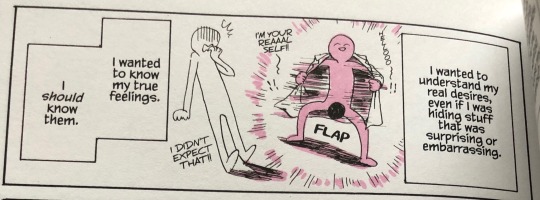
5. Too Much and Not the Mood by Durga Chew-Bose (2017)
This book revolutionized the way I thought about personal essays. This is not “I had a mildly risqué experience as a young white middle class cis woman which I will now recount to you for money.” Nor is it really my much-beloved genre of creative nonfiction that combines rapturous descriptions of the taste and scent of peaches with rigorously researched discursions on the history of the state of Georgia. No, this is a creative explosion, raining color and candy, flashing by your face too quickly to be fully registered but delightful all the same. Chew-Bose writes stream of consciousness, but one loaded with sharply observed images and quicksilver thoughts, tangents to tangents to tangents, some circling back and some not, personal memory and constant cascades of cultural commentary threading together into universal but deeply personal tapestries. If you have any taste at all for either essays or virtuoso writing you MUST read this book.
I think that’s a good stopping point for me. Curious to see if anyone else does this prompt and if so, what they pick.
7 notes
·
View notes
Text
« The Revolution swept away the prerogatives of the Crown associated with English land tenure in America. In America, ownership meant freedom from the meddling of nobles, the right to freely dispose of land by sale at a profit. . . American land law was predicated on the paramount principle that land was first and foremost a commodity for capital gain.
. . . Other Old World values toppled before this new system—for example, the idea of land as a physical container for community values. Nearly eradicated in the rush for profit was the concept of stewardship, of land as public trust. . . [T]he genius of American land law [...] "lay in its identification of land as a civil liberty instead of a social resource."
. . . A system was needed to divide [land] up for sale. The answer was the national grid. . . It was fair and square and easy to understand. The federal survey platted land into square units measuring six miles on each side. . . Over five million [family] farms were platted on public land between 1800 and 1900. Expeditious as it was—indeed, it is hard to imagine a more rational method—the national grid had some serious drawbacks. . . In terms of rural life, the grid institutionalized the trend toward scattered farms, rather than agricultural villages, giving physical expression to the powerful myth that only the individual mattered in America.
The new towns of the Midwest were more often than not laid out on grids that echoed the larger grid of the surrounding countryside, with some unfortunate results. The grid was primarily concerned with the squares of private property that lay within the gradients, not with the gradients themselves, or how the two related to one another. This dictated a way of thinking about the community in which private property was everything and the public realm—namely, the streets that connected all the separate pieces of private property—counted for nothing. This spawned towns composed of blocks unmodified by devices of civic art, checker-board towns without visible centers, open spaces, odd little corners, or places set aside for the public's enjoyment. »
— James Howard Kunstler, The Geography of Nowhere: The rise and decline of America's man-made landscape
41 notes
·
View notes
Text
8 notes
·
View notes
Text
Age of Anxiety
Forgive me at this juncture for repeating my oft-stated theory of history: Things happen because they seem like a good idea at the time. Off-shoring seemed like a good idea at the time. Fob off all those filthy, polluting factories onto other countries, and pay the natives three bucks a day to make all the stuff we needed. Plus, pay for the stuff with US treasuries (IOUs). What a racket! But then every activity in America was turning into a racket — which is to say, making money dishonestly — until it became the immersive economic milieu of the land. Even the two most noble endeavors in our society, education and medicine, disgraced themselves with shameless moneygrubbing.
Excerpt from Crazyland by James Howard Kunstler
9 notes
·
View notes
Note
what are some of your favorite books
I have to admit I only really started reading for pleasure again in the past year or so! I did more as a teen, and I’m so glad I came back to it. But here are a few favorites.
Giovanni’s Room by James Baldwin
-absolutely beautiful writing, and historically significant gay rep. The prose is poetic yet concise, and at times devastating
Fun Home by Allison Bechdel
-witty but deeply emotional, and has me curious about graphic novels as a medium. Gimme recommendations for these
Geography of Nowhere by Howard Kunstler
-one of the most important pieces of urbanist literature; really puts into perspective how the United States became such a suburban hell
How Long til Black Future Month by NK Jemison
-Great sci fi anthology. She mixes the fantastic and the mundane nicely, and even in short stories immerses you into the setting
On Earth We’re Briefly Gorgeous
-absolutely stunning poetry novel about generational trauma, homophobia, the opioid crisis, and Vietnamese identity
24 notes
·
View notes
Text
My March & April Reads
No One Is Talking About This, Patricia Lockwood - I laughed, I sobbed, I loved the paragraph about LeBron James's genius. If you don't spend time on Twitter, I'm not sure the first half will make sense, but I am (unfortunately) terminally online and thought the entire book was perfect and incredible.
The Geography of Nowhere: The Rise and Decline of America's Man-Made Landscape, James Howard Kunstler - Throughout grade school and high school, I was lonely, panicked, generally depressed. Then I went away to college and I was still depressed—because I was surrounded by wealthy conservatives—but it was at college that I figured out my main problem: I'm allergic to suburban sprawl! I hate driving! I like walking and being around other people! Kunstler's book tells the history of America's small towns, cities, and suburbs, and explains how this country became a series of giant, hideous parking lots.
Small Things Like These, Claire Keegan - Very beautiful, very Irish, very sad. It's a Christmas novella! Much like Daddy Furlong, I can't believe life is just work work work, bills bills bills.
Sorrow and Bliss, Meg Mason - A quirky sad girl book......in fact, it was perhaps a bit too sad for this season of my life (as my favorite woo-woo podcasters would say).
Breasts and Eggs, Mieko Kawakami - Have I mentioned that I joined a new book club and it's great? I did and it is. This was a book club pick and I haven't read anything quite like it before. If you too are tired of the "I'm a new mom and parenthood is HARD" theme of many recent books, rest assured: Breasts and Eggs is not that. It's been a few weeks since I finished reading and I'm still thinking about it.
What Are You Going Through, Sigrid Nunez - Okay, I enjoyed this because I love Nunez's writing, but I've already forgotten everything about it. Sorry!
How Strange a Season, Megan Mayhew Bergman - A new MMB story collection, what a treat. The standouts for me: "Peaches, 1979," "Inheritance," and "Indigo Run."
Very Cold People, Sarah Manguso - Lovely writing, but NO. Just say no to this endlessly bleak book. Its existence upsets me.
Funny You Should Ask, Elissa Sussman - I needed a breezy book after my previous disastrous choice, and this did the trick! The format makes it a super fast read—there are Then vs Now chapters, plus a combination of blog posts, movie and book reviews, and gossip columns.
Book Lovers, Emily Henry - Another five-star read from Emily Henry! As is typical with this author, there's a lot to love beyond the romance. Book Lovers is also a celebration of family (especially sisters), of living in a big city (specifically New York City), of pursuing your dreams (but responsibly and not in a corny way). The book grapples with the fact that growing older is often a bummer, but all that grappling is softened by a cast of lovable characters and truly funny jokes. And yes, that epilogue made me cry.
#books#booklr#monthly reads#reading#march#april#am reading#literature#romance#short stories#emily henry#book lovers#elissa sussman#funny you should ask#sarah manguso#very cold people#megan mayhew bergman#how strange a season#climate change#sigrid nunez#what are you going through#mieko kawakami#breasts and eggs#translation#meg mason#sorrow and bliss#claire keegan#small things like these#novella#james howard kunstler
12 notes
·
View notes
Text
The Geography of Nowhere: The Rise and Decline of America's Man-Made Landscape
The Geography of Nowhere: The Rise and Decline of America’s Man-Made Landscape
The Geography of Nowhere: The Rise and Decline of America’s Man-Made Landscape James Howard Kunstler
The Geography of Nowhere traces America’s evolution from a nation of Main Streets and coherent communities to a land where every place is like no place in particular, where the cities are dead zones and the countryside is a wasteland of cartoon architecture and parking lots. In elegant and often…
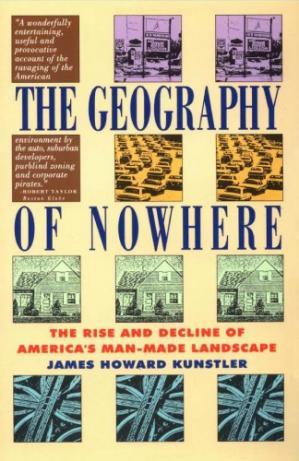
View On WordPress
2 notes
·
View notes
Link
0 notes
Text
Books I Read in 2023
Nonfiction:
"Why Fish Don't Exist" by Lulu Miller
"Disrupted: My Misadventure in the Start-Up Bubble" by Daniel Lyons
"Lab Rats: How Silicon Valley Made Work Miserable for the Rest of Us" by Daniel Lyons
"Secret City: The Hidden History of Gay Washington" by James Kirchick
"Token Black Girl" by Danielle Prescod
"The Geography of Nowhere" by James Howard Kunstler
"Code Girls: The Untold Story of the American Women Code Breakers of World War II" by Liza Mundy
"The Devian's War: The Homosexual vs. The United States of America" by Eric Cervini
"The Family Next Door: The Heartbreaking Imprisonment of the Thirteen Turpin Siblings and their Extraordinary Rescue" by John Glatt
"Jesus and John Wayne: How White Evangelicals Corrupted a Faith and Fractured a Nation" by Kristin Kobes Du Mez
"Cults: Inside the World's Most Notorious Groups and Understanding the People Who Joined Them" by Max Cutler
"Raw Dog: The Naked Truth About Hot Dogs" by Jamie Loftus
"The Domestic Revolution: How the Introduction of Coal into Victorian Homes Changed Everything" by Ruth Goodman
"How to Behave Badly in Elizabethan England" by Ruth Goodman
"What We Don't Talk About When We Talk About Fat" by Aubrey Gordon
"'You Just Need to Lose Weight' and 19 Other Myths About Fat People" by Aubrey Gordon
"Hollywood's Children: An Inside Account of the Child Star Era" by Diana Serra Cary
"Wild Things: The Joy of Reading Children's Literature as an Adult" by Bruce Handy
"The Internet Con: How to Seize the Means of Computation" by Cory Doctorow
Fiction
"What Moves the Dead" by T Kingfisher
"Illuminations" by T Kingfisher
"Can't Spell Treason Without Tea" by Rebecca Thorne
"Coffee, Milk and Spider Silk" by Coyote JM Edwards
"Legends & Lattes" by Travis Baldree
"Unbury the Bones" by Coyote JM Edwards
"Chase: The Boy Who Hid" by Z Jeffries
"Encore in Death" by J. D. Robb
"Escape from Incel Island" by Margaret Killjoy
"The Bookshop and the Barbarian" by Morgan Stang
"A House With Good Bones" by T Kingfisher
"Sorcery & Scones" by S. R. Meadows
"Humans Wanted" edited by Vivian Caethe
"Parable of the Sower" by Octavia Butler
"A Wrinkle in Time" by Madeline L'Engle
"Boneless" by Coyote JM Edwards
"Red White and Royal Blue" by Casey McQuiston
"Toad Words" by T Kingfisher
"Camp Damascus" by Chuck Tingle
"The Halcyon Fairy Book" by T Kingfisher
"Jackalope Wives and Other Stories" by T Kingfisher
"A Killer's Game" by Isabella Maldonado
"Payback in Death" by J. D. Robb
1 note
·
View note